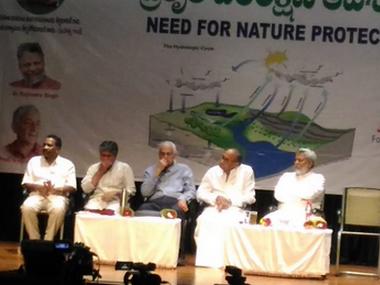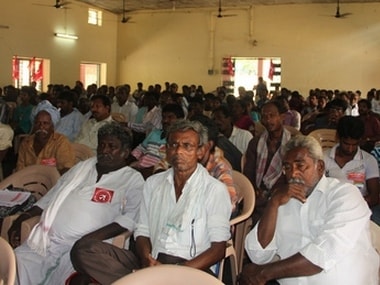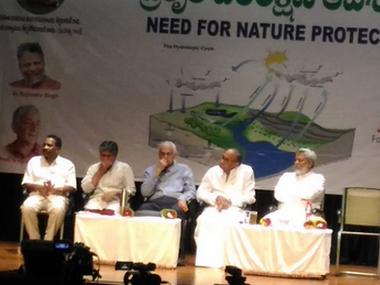Even at 5 pm, the sun was blazing down mightily on the people of Vijayawada. Inside the air conditioned auditorium of Makineni Basavapunnaiah Vignana Kendram, over 250 people waited patiently for the proceedings to start. It was a Sunday evening and the crowd, comprising mostly farmers and a few groups of activists from in and around Vijayawada and Guntur, had gathered to hear a star-studded panel of speakers talk about “Need for Nature Protection”. [caption id=“attachment_4481657” align=“alignleft” width=“380”]  Need for Nature Protection meeting on Sunday. Image courtesy: Swati Sanyal Tarafdar[/caption] Convened by politician-turned-activist Satyanarayana Bolisetti, the meeting saw experts from across the country — Dr Rajendra Singh, professor Vikram Soni, PV Rajagopal, and Romi Khosla — deliberate on important issues of development and associated environmental degradation. They spoke about why we need a better quality of life and not a higher standard of living, why floodplains should be protected and rivers should not be interlinked. The aim of this meeting was to generate awareness and create a solid platform of resistance against the environmental degradation — call it the construction of the new capital Amaravati or the large-scale illegal sand mining — that is happening all around the state, especially on the banks of the River Krishna, uninhibited. Unfortunately, even such an august gathering failed to draw a full house: Something that the organisers regretted thoroughly and the speakers rued. Bolisetti later said he was happy with the numbers and that united, they can still put up a brave front against the environmental atrocities. He expressed anguish over the fact that “unlike the KCR government in Telangana, the TDP government in Andhra Pradesh is not interested in making the common people aware of environmental issues. I paid for the entire arrangement out of my own pocket, didn’t ask for their support, yet they didn’t even allow me to use the government auditorium”. Bolisetti’s attempt is the latest in a series of efforts by environmentalists and activists struggling to raise public awareness in Andhra Pradesh. A strong resistance against the government’s apathy towards the environment is absolutely necessary, said PV Rajagopal, the Gandhian activist who is planning yet another massive padayatra of Dalits, women, and agriculturists in September-October. A similar resistance is necessary in Andhra Pradesh, yet it’s largely absent. Earlier in 2017, Srimannarayana Pandalaneni floated his public forum “Green Soldiers” to fight against Chief Minister Chandrababu Naidu’s plan of building a capital on the Krishna floodplains. The forum, despite stifling paucity of funds, tried organising public talks and bringing together resourceful orators such as the former Andhra Pradesh chief secretary IYR Krishna Rao to debate on the capital city which is facing the river and generate awareness among the people to fight for the environment. Later, Rao published his arguments in “Whose Capital, Amaravathi?” to make his thoughts freely accessible to people. Tollywood celebrity and Jana Sena chief Pawan Kalyan keeps visiting Vijayawada to meet farmers and volunteers to promote their cause. His party has adopted the agenda to fight for the protection of the farmers and the environment and he has met the chief minister on several occasions. [caption id=“attachment_4481679” align=“alignright” width=“380”]  A meeting of landless labourers. Image courtesy: Swati Sanyal Tarafdar[/caption] Despite these efforts, the general climate in Amaravati, Vijayawada, Guntur, and around is of casual opposition hinting at general indifference. The fight is solely of the victims and those directly affected: It has not spread and spilled into the rest of the society or the general public. “The people in this region are separated by factions and groups and each have their own egos and goals in mind. Some want to have Amaravati but not on the floodplains, some wants to have Amaravati as a natural or decentralised capital, some want to sell their lands and enjoy the benefits, some are happy with the Rs 2,500 monthly compensation. But we do not realise the harm being done to our soil for which our children and grandchildren will suffer. In this situation, it is impossible to unite into a strong resistance and the chief minister is also aware of his peoples’ weaknesses”, said G Kanna Rao Naidu, who is spearheading the fight against land pooling and acquisition in Undavalli, a village by the Krishna River, selected to be the gateway to Naidu’s Amaravati. “Most farmers in and around Penumaka, Tulllur, Lingayapalem and other villages believe that the world class capital is not going to happen. They see through the government’s plan to grab land and are more concerned about protecting their own parcels of lands from real estate sharks”, said Nagi Reddy, a former education officer in Nidamarru. He admitted there are too many groups fighting out of each village and mandal and said they are indeed trying to unite all groups and put up a stronger front “but that’s a mammoth task”. “There is excessive police presence in Amaravati area. Many false cases have been filed against those opposing land acquisitions. There were instances of standing crops burnt down”, said EAS Sarma, a former bureaucrat who served as secretary in the ministries of finance and power. Sarma has been petitioning the NGT to stop “misbehaviour” with natural resources. Sarma explained that the politics of fear and revenge has, of course, done its bit in not uniting the villagers in Amaravati who are the immediate victims. Dr C Ramachandraiah, professor in Urban Studies, Centre for Economic and Social Studies (CESS), Hyderabad agreed. “The entire State machinery (police, revenue, intelligence, ministers), real estate and ruling party thugs went after farmers who were resisting land pooling”, he said. He further explained that the pro-TDP caste played a major role in mustering support for the government in the initial phase of land pooling. Bolisetty, who is currently traveling across Andhra Pradesh and Telengana, meeting experts and activists to spread word about the illegal sand mining happening on the banks of the Krishna, and who is supporting Singh’s attempt to rejuvenate the river, said “greed for money, fear, and business interests” have crippled large sections of the populace who do not want to get involved into anything that is not profitable or may harm their cause. “Land owners are interested in money and do not bother about tillers and people depending on agriculture for livelihood”, he said, regretfully. When the Left Front government tried capturing 10,000 acres of agricultural lands in Nandigrama and Singur in 2007 to lease to TATA, the entire state erupted in protest. “My feeling is that the main Opposition party extended its support to the struggle. Mamata Banerjee was even on a hunger strike in Singur, if I remember”, reminisced Ramachandraiah. On the contrary, “the Opposition party is very weak in most of the villages in Tullur mandal which is the main capital area (in Amaravati). Where the Opposition is strong, the resistance has been continuing even now, such as in Nidamarru, Undavalli, Penumaka, etc”. Ramachandraiah, an expert in social studies, further explained several social and cultural factors that hinder the coming together of the many dissenting groups. “A people’s movement has not spanned across Andhra Pradesh in the past 15 years. Also, privatisation of education and reckless promotion and consumption of liquor have made youth movements non-existent”. The absence of the youth and women in the scheme of things is a major lacuna. The protests against environmental atrocities and a movement to protect our environment needs to be borne from every member of a community. With the focus on more practical and material aspects of life, this evolution seems to be taking a little too long for Andhra Pradesh.
Sunday’s attempt is the latest in a series of efforts by environmentalists and activists struggling to raise public awareness in Andhra Pradesh
Advertisement
End of Article


)

)
)
)
)
)
)
)
)



